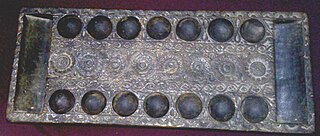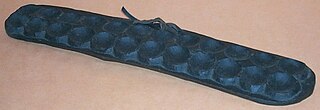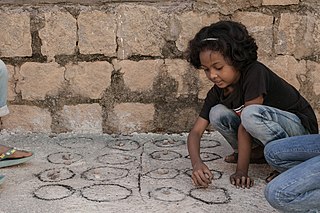Related Research Articles

Mancala refers to a family of two-player turn-based strategy board games played with small stones, beans, or seeds and rows of holes or pits in the earth, a board or other playing surface. The objective is usually to capture all or some set of the opponent's pieces.

Oware is an abstract strategy game among the mancala family of board games played worldwide with slight variations as to the layout of the game, number of players and strategy of play. Its origin is uncertain but it is widely believed to be of Ashanti origin.

Kalah is a modern variation in the ancient Mancala family of games, the oldest known version having been found carved into a stone tablet in the 16th-century BCE pyramid of Cheops. The Kalah variation was developed in the United States by William Julius Champion, Jr. in 1940. This game is sometimes also called "Kalahari", possibly by false etymology from the Kalahari desert in Namibia.

Omweso is the traditional mancala game of the Ugandan people. The game was supposedly introduced by the Bachwezi people of the ancient Bunyoro-kitara empire of Uganda. Nowadays the game is dominated by Ugandan villagers. It is a very hard and fast game said to keep one's mind high and ever excited, which can make it addictive. The equipment needed for the game is essentially the same as that of the Bao game. Omweso is strictly related to a wide family of mancalas found in eastern and southern Africa; these include Coro in the Lango region of Uganda, Aweet in Sudan, ǁHus in Namibia, Kombe in Lamu (Kenya), Mongale in Mombasa (Kenya), Mongola in Congo, Igisoro in Rwanda, and Kiela in Angola.
Ba-awa is a variant of the game of mancala originating in Ghana. Although played in some of the same regions as Oware, it is simpler and in traditional societies is considered a game for women and children. Ba-awa is related to games j'erin and obridjie played in Nigeria. It is also similar to mancala game anywoli played at the Ethiopian-Sudanese border.

Bao is a traditional mancala board game played in most of East Africa including Kenya, Rwanda, Tanzania, Comoros, Malawi, as well as some areas of DR Congo and Burundi. It is most popular among the Swahili people of Tanzania and Kenya; the name itself "Bao" is the Swahili word for "board" or "board game". In Tanzania, and especially Zanzibar, a "bao master" is held in high respect. In Malawi, a close variant of the game is known as Bawo, which is the Yao equivalent of the Swahili name.

Owela, also referred to by the Khoekhoe language loanword ǁHus, is the Oshiwambo name of a traditional mancala board game played by the Nama people, Herero people, Rukwangali speakers, and other ethnic groups from Namibia. It is related to the Omweso family of mancala games played in Eastern and Southern Africa. Although this is an abstract strategy game, the consequences of individual moves are so hard to predict that it can be considered, to some extent, a game of chance.

Pallanguli, or Pallankuli, is a traditional ancient mancala game played in South India, especially Tamil Nadu and Kerala. This game was later introduced to Karnataka and Andhra Pradesh in India, as well as Sri Lanka and Malaysia. The game is played by two players, with a wooden board that has fourteen pits in all (hence, it is also called fourteen pits, or pathinālam kuḻi. There have been several variations in the layout of the pits, one among them being seven pits on each player's side. The pits contain cowry shells, seeds or small pebbles used as counters. There are several variations of the game depending on the number of shells each player starts with.

Ali Guli Mane is an abstract strategy board game of the mancala family, from Karnataka in South India. It is known as Chenne Mane in Tulunaadu, Akal Patta in North Karnataka and Satkoli (सत्कोलि) in Maharashtra. The name of the game, like that of many mancala games across the world, is simply a description of the board used: it means a "wooden block with holes". It is similar to Pallanguzhi from the neighbouring state of Tamil Nadu. There are also similarities with the traditional Malay mancala game Congkak.
Andada is a traditional mancala game played by the Kunama people of western Eritrea. It closely resembles other mancalas from East Africa such as Enkeshui and Layli Goobalay.
Anywoli is a traditional mancala game played by the Anuak people of the Gambela province, in Ethiopia, as well as in the Akobo, Pochalla and Jokau regions of Sudan. The name of the game means "bringing to life". Anywoli has similarities to mancalas found in Nigeria and Ghana, such as Ba-awa and Obridjie.

Ayo is a traditional mancala played by the Yoruba people in Nigeria. It is very close to the Oware game that spread to the Americas with the atlantic slave trade. Among modern mancalas, which are most often derived from Warri, the Kalah is a notable one that has essentially the same rules as Ayo.

Endodoi is a traditional mancala game played by the Maasai people of Kenya and Tanzania. It is very close to the Ayoayo game of the Yoruba people of Nigeria, although there is no evidence of a direct relationship between the two. Maasai are known to play Endodoi very quickly, to the point that an external observer may find it hard to even distinguish individual moves and turns.
Hawalis is a traditional mancala game played in Oman as well as Zanzibar, where it is known as Bao la Kiarabu, with slightly different rules. It is closely related to African mancalas such as Bao, Njomba, Lela, Mulabalaba (Zambia), Muvalavala (Angola) and Tschuba.

Enkeshui is a traditional mancala game played by the Maasai of both Kenya and Tanzania. It is a rather complex mancala game, and bears some similarities to the Layli Goobalay mancala played in Somaliland.
Isolo is a traditional mancala game played by the Sukuma people in northern Tanzania. The rules of the game come in three variants, respectively for women, boys and men.

Katro is a traditional mancala game played by the Betsileo people in the Fianarantsoa Province of Madagascar. The game was first described by Alex de Voogt in 1998.
Kiothi is a traditional mancala game played by the Meru people in Kenya. The word "kiothi" simply means "to place". This mancala is closely related to the Enkeshui and the Giuthi mancalas, respectively played by the Maasai, the Kikuyu and Embu people.

Kisolo is a traditional mancala game played by the Luba, Lulua and Songye peoples of DR Congo, Zambia and Zimbabwe. It is closely related to other East African mancalas such as Bao, Bao Kiarabu, Coro and Isolo.

Layli Goobalay is a board game played in parts of Somalia. It is a variant of the classical count and capture game mancala, which is one of the oldest two-player strategy board games played throughout the world. Layli Goobalay means "to exercise with circles" in the Somali language.